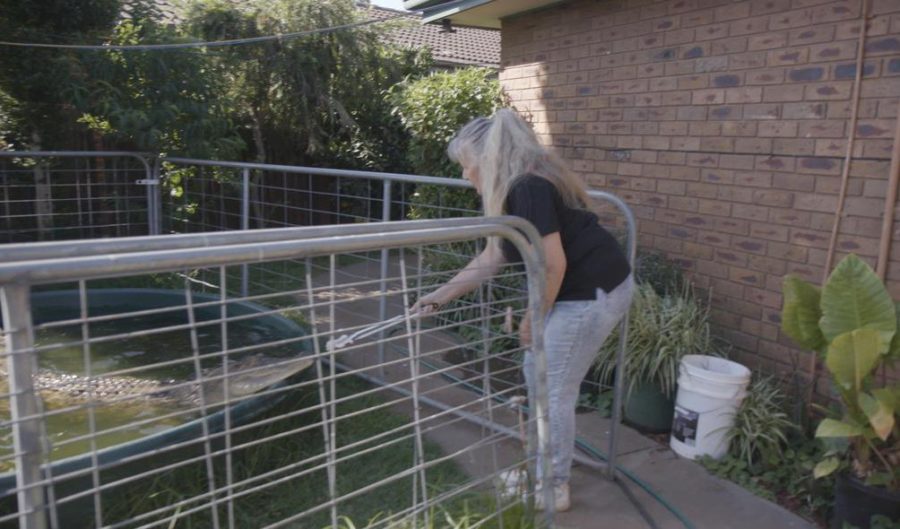Croc Lady: Is living with crocodiles in suburbia ethical?

AFTER VICE’S documentary and feature article on west Melbourne’s ‘Croc Lady’ Vicki Lowing, who lives with five crocodiles in her suburban home, questions have justifiably been raised.
Vicki’s salt water and fresh water crocodiles Johnie, Johnie Jnr, Fovian, Jilfia and Jilfia Jnr are unlike other crocodiles in that they’re completely comfortable around humans because of their captive upbringing.
Vice journalist Katherine Gillespie reported that one of the crocodiles, Johnie, is even known to sleep in Vicki’s bed, accompany her on drives and takes walks along suburban paths.
However, one of her crcocs, Jilfia is getting so big that a much larger enclosure will be necessary if Vicki is to meet Victorian wildlife regulations.
See more: Welcome to croc country
A passionate wildlife carer
Vicki is a licensed reptile owner with a lifetime of experience working with crocodiles.
Charlie Manolis, the chief scientist at Wildlife Management International, who’s known Vicki for 14 years, told Australian Geographic that this isn’t just someone who’s gone and picked a crocodile up for the fun of it.
“Johnie was initially raised in western NSW and had an adverse reaction to algae in the water and she chose to completely move locations. Vicki went to huge lengths to make sure that that animal was healthy. She loves her animals and she does look after them,” he says.
“People often say when they see a croc in a 5x5m enclosure ‘he can’t exercise’, but they don’t exercise, they don’t want to exercise.
“If you sat there all day you wouldn’t see them move. They’re whole life is designed around sleeping, eating and reproducing and saving energy.”
According to the report, Vicki’s five crocodiles came into her care after those who initially bought them weren’t willing to look after them any longer. Once these animals came into her care her options would have been limited.
“There’s no way they can be released, even releasing captive animals in with captive animals can be extremely dangerous, let alone releasing a captive animal into a wild population. It can’t happen, the animal would suffer,” says Daniel Rumsay, the head of reptiles at the Australian Reptile Park.
See more: Climate change will effect our crocodiles
“I mean you could call your local parks and wildlife office to place it in an appropriate home but it sounds like this lady just loves her crocs and loves reptiles and she’s just doing what she feels is right,” he tells Australian Geographic.
“She gave them a home. The other option could have been euthanasia which is horrible so she’s saved them from that option, which is good.”
A lifetime job
Daniel says that the bigger issue here is that people don’t fully comprehehnd that looking after reptiles is a lifetime job.
“People will buy a pennty turtle thinking it won’t get big and all of sudden it’s the size of a dinner plate. You’re investing in animal that make go through multiple generations.
“You need to plan and house that animal for multiple generations, otherwise it brings on the issue of euthanasia and that shouldn’t come about from your own poor collection management.”
See more: Endangered sawfish battles crocs and sharks
In saying that, Daniel doesn’t advise for just anyone to go out and adopt a crocodile.
“I can’t think of a reason why an experienced reptile keeper wouldn’t be able to house a freshwater crocodile but the stipulation would have to be that you have to be prepared to house that animal for the its whole life, and for a crocodile, that can be up to a hundred years.”
In the article, Vicki echoes these sentiments.
“Some people will go out and get a crocodile as though it’s a pitbull, and it just doesn’t work like that. The animal suffers, and of course they can be very dangerous. I don’t want to say only I can have them, but they’re definitely only for professionals,” she tells Vice.
READ MORE:
- Steve Irwin’s legacy in Cape York
- Climbing crocs survey territory from above
- Irwins to continue Steve’s legacy by making a return to Animal Planet

